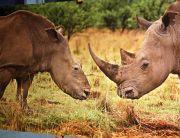
(photo: iStockphoto/EcoPic)
Time is running out for a number of wildlife species that are an integral part of the ecosystem. Recognising this growing urgency for the animals, and for man, more than 100 participants from ministries, NGOs, embassies and research institutions met at the British Embassy in Berlin on 22 January for an event on the fight against wildlife crime. Their focus was how to more jointly combat activities such as the poaching of rhinos for their horns, the killing of elephants for ivory, or the trade in endangered reptiles.
A panel discussion featuring four prominent actors in the fight against the illegal wildlife trade (list below) examined how developed and developing countries can work together better. The audience actively participated with their own views and questions.
Europe was highlighted as a destination or transit point for the global smuggling of animal products. It was stated that Europe needs to "get its own house in order," by focusing on reducing demand for poached products and strengthening detection measures at borders – before insisting that developing countries implement new measures to limit supplies of illegal goods. Audience members suggested ideas such as implementing sanctions on destination countries, revising penalties to be steep enough to effectively deter the practice, and fighting the trade further on the Internet.
Poverty and the lack of alternative sources of income factors were recognised as inherent factors in developing countries, leading people to engage in wildlife crimes, so much that it was stated that poaching is no longer just a conservation issue, but a development issue. The involvement of local communities was seen as crucial to both preventing poaching and ensuring livelihoods. The loss of pastoral societies and the proliferation of arms were key concerns, because the attitude of “who cares about the elephant when I’m trying to survive” reflects the need to find a way to empower local people so that poaching is not the only viable choice for livelihood.
Recognising the importance of changing the socio-economic aspect, it was stressed that prevention clearly trumps enforcement, because it’s too late when the animals are dead.
Click here for photos from the discussions and reception at the UK Embassy event in Berlin
The wildlife event was opened with remarks from the British Ambassador to Germany, HMA Simon McDonald. Christiane Gerstetter with the Ecologic Institute then introduced EFFACE to the audience. Christiane remarked that one problem is that environmental crime is considered difficult to measure and enforce, and authorities may often opt to prosecute on related fraud charges instead of pursuing the more difficult conviction of environmental crime.
Eberhard Brandes, CEO of WWF Germany, provided an overview of the dire threats to iconic species and local rangers’ work in protecting them, noting that the illegal wildlife trade is now worth an estimated €10 billion annually. Much of it is channeled through uncontrolled financial flows, potentially supporting armed rebel groups, organized crime and other illegal activities. However, Eberhard noted that more governments are taking responsibility for combating these crimes.
The panel members, moderated by R. Andreas Kraemer, Director of Ecologic Institute:
· Margit Hellwig-Bötte, a Visiting Fellow in the Middle East and Africa Division of the German Institute for International and Security Affairs (SWP)
· Roberto Zolho, Coordinator of the Rovuma Landscape for the WWF East Africa Programme
· Dr. Jennifer Maher, Senior Lecturer in Criminology at the University of South Wales
· Simon Gallagher, the Deputy Head of Mission of the British Embassy in Berlin









